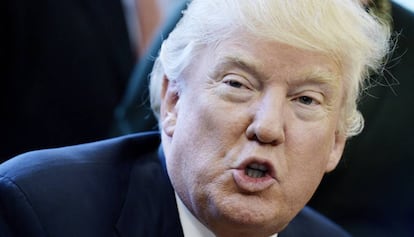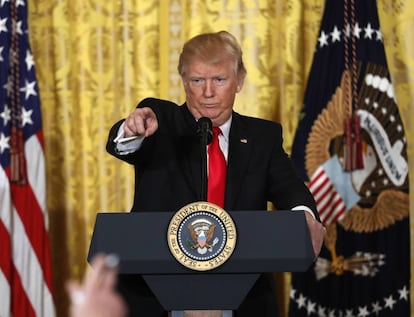Is Trump Really Crazy?
The president exhibits the classic symptoms of narcissistic personality disorder

I have been studying power for years; those who have it and those who have lost it. My main conclusion is that while the essence of power – the ability to make others do or stop doing something – has not changed, the ways of obtaining, using, and losing it have undergone profound changes. Another observation is that the personalities of the powerful are as heterogeneous as humanity itself. They can be introverts or extroverts, brave or cowardly, brilliant or mediocre. However, despite their diversity, they all have two features in common: they are charismatic and vain. Here I’ll define charisma as “the special ability some people have to attract or fascinate.”
Some of the most bloodthirsty tyrants in history have shown acute forms of narcissism
Charismatic leaders inspire great devotion and, inevitably, the applause, flattery and praise they receive inflates their vanity. It is easy for this superlative vanity to transform into a narcissism that can be pathological. In fact, I am convinced that one of the most common professional risks among successful politicians, artists, athletes, and entrepreneurs is narcissism. In its more moderate forms, this narcissism, the fascination with oneself, is irrelevant. But when it becomes more intense and dominates the performance of those in power, it can be very dangerous. For example, some of the most bloodthirsty tyrants in history have shown acute forms of narcissism, and large corporations have failed because of their owners’ narcissistic delusions.
The American Psychiatric Association has developed criteria to diagnose pathological narcissism. They call it “narcissistic personality disorder” (NPD) and, according to research, people who suffer from it display a persistent megalomania, an excessive need to be admired, and a lack of empathy. They show great arrogance, feelings of superiority, and behaviors focused on obtaining power. They also suffer from very fragile egos, they do not tolerate criticism, and they tend to despise others in order to reaffirm themselves. According to the handbook of the American Psychiatric Association, sufferers of NPD have all or most of these symptoms:
1) Megalomaniac feelings and expectations that their superiority should be recognized.
2) Fixation on fantasies of power, success, intelligence, and physical attractiveness.
3) Perception of being unique, superior, and therefore seeks groups and institutions of high status.
4) Constant need for admiration from others.
5) Feeling entitled to be treated in a special way and that others should obey them.
6) Propensity to exploit others and take advantage of them to obtain personal benefits.
7) Inability to empathize with the feelings, desires, and needs of others.
8) Intense envy of others and a conviction that others are equally envious of them.
9) Propensity to behave pompously and arrogantly.
And now let’s talk about Donald Trump.

There is no doubt that the American president exhibits many of these symptoms. But does that make him unfit to occupy one of the most important positions on our planet? A group of psychiatrists and psychologists think so. They sent a letter to The New York Times in which they point out: “Mr. Trump’s speech and actions demonstrate an inability to tolerate views different from his own, leading to rage reactions. His words and behavior suggest a profound inability to empathize. Individuals with these traits distort reality to suit their psychological state, attacking facts and those who convey them (journalists, scientists). In a powerful leader, these attacks are likely to increase, as his personal myth of greatness appears to be confirmed. We believe that the grave emotional instability indicated by Mr. Trump’s speech and actions makes him incapable of serving safely as president.”
Mr. Trump’s speech and actions demonstrate an inability to tolerate views different from his own, leading to rage reactions A group of psychologists in a letter to the New York Times
This letter is, of course, very controversial. Not only because of the position it takes with respect to President Trump, but also because it violates the code of ethics of the American Psychiatric Association. The code maintains that no one can be diagnosed – especially a public personality – at a distance. An in-person evaluation is essential. However, in the letter the signatories maintain: “But this silence has resulted in a failure to lend our expertise to worried journalists and members of Congress at this critical time. We fear that too much is at stake to be silent any longer.” Alexandra Rolde, one of the psychiatrists who signed the letter, told journalist Catherine Caruso that her purpose and that of her colleagues was not to diagnose Trump, but to emphasize personality traits that worry them.
Rolde does not believe that a diagnosis should be made without having examined the patient, but thinks that it is appropriate to show how a person’s mental health can affect others or limit their ability to perform adequately.
Other psychiatrists disagree: “Most amateur diagnosticians have mislabeled President Trump with the diagnosis of narcissistic personality disorder. I wrote the criteria that define this disorder, and Mr. Trump doesn’t meet them. He may be a world-class narcissist, but this doesn’t make him mentally ill, because he does not suffer from the distress and impairment required to diagnose mental disorder. Mr. Trump causes severe distress rather than experiencing it and has been richly rewarded, rather than punished, for his grandiosity, self-absorption, and lack of empathy.”
More important than the mental health of the president is the political health of the country
The author of this letter is psychiatrist Allen Francis, director of the working group that prepared the fourth edition of the Diagnostic and Statistical Manual of Mental Disorders (D.S.M. IV). What is surprising is that Dr. Francis reaches beyond his specialty: “Psychiatric name-calling is a misguided way of countering Mr. Trump’s attack on democracy. He can, and should, be appropriately denounced for his ignorance, incompetence, impulsivity and pursuit of dictatorial powers. His psychological motivations are too obvious to be interesting, and analyzing them will not halt his headlong power grab. The antidote to a dystopic Trumpean dark age is political, not psychological.”
It is easy to agree with one of Dr. Francis’s conclusions, but less so with the other. The conclusion that is easier to accept is that more important than the mental health of the president is the political health of the country. The ability of our institutions to withstand Trump’s attempts to concentrate power is the most important battle ever waged in the United States. Its results will have global consequences. Francis’s other conclusion is that Donald Trump’s mental stability is irrelevant. I disagree. Trump has been in the White House for only a few weeks and his behavior is already a cause for alarm. The president's problems and frustrations will intensify. And that is not good for his mental health.
Follow me on Twitter @moisesnaim.
Tu suscripción se está usando en otro dispositivo
¿Quieres añadir otro usuario a tu suscripción?
Si continúas leyendo en este dispositivo, no se podrá leer en el otro.
FlechaTu suscripción se está usando en otro dispositivo y solo puedes acceder a EL PAÍS desde un dispositivo a la vez.
Si quieres compartir tu cuenta, cambia tu suscripción a la modalidad Premium, así podrás añadir otro usuario. Cada uno accederá con su propia cuenta de email, lo que os permitirá personalizar vuestra experiencia en EL PAÍS.
¿Tienes una suscripción de empresa? Accede aquí para contratar más cuentas.
En el caso de no saber quién está usando tu cuenta, te recomendamos cambiar tu contraseña aquí.
Si decides continuar compartiendo tu cuenta, este mensaje se mostrará en tu dispositivo y en el de la otra persona que está usando tu cuenta de forma indefinida, afectando a tu experiencia de lectura. Puedes consultar aquí los términos y condiciones de la suscripción digital.









































